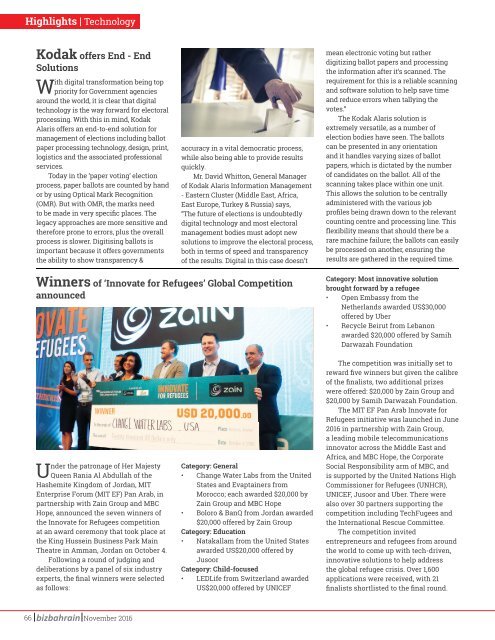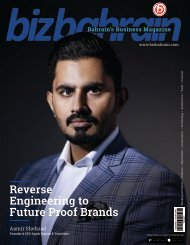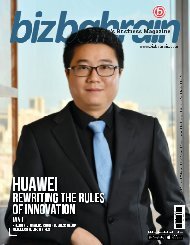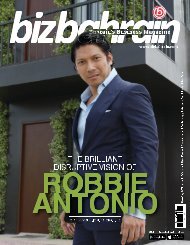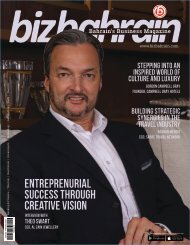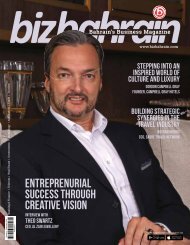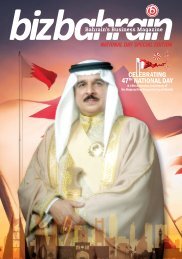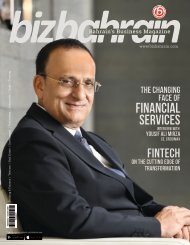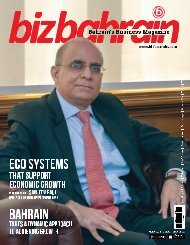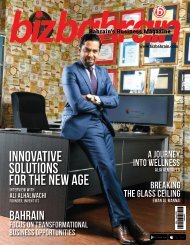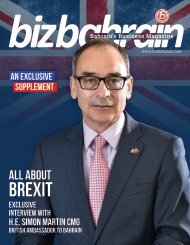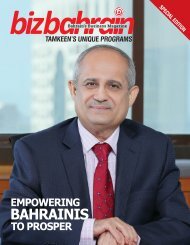BizBahrain November 2016
You also want an ePaper? Increase the reach of your titles
YUMPU automatically turns print PDFs into web optimized ePapers that Google loves.
Highlights | Technology<br />
Kodak offers End - End<br />
Solutions<br />
With digital transformation being top<br />
priority for Government agencies<br />
around the world, it is clear that digital<br />
technology is the way forward for electoral<br />
processing. With this in mind, Kodak<br />
Alaris offers an end-to-end solution for<br />
management of elections including ballot<br />
paper processing technology, design, print,<br />
logistics and the associated professional<br />
services.<br />
Today in the ‘paper voting’ election<br />
process, paper ballots are counted by hand<br />
or by using Optical Mark Recognition<br />
(OMR). But with OMR, the marks need<br />
to be made in very specific places. The<br />
legacy approaches are more sensitive and<br />
therefore prone to errors, plus the overall<br />
process is slower. Digitising ballots is<br />
important because it offers governments<br />
the ability to show transparency &<br />
accuracy in a vital democratic process,<br />
while also being able to provide results<br />
quickly.<br />
Mr. David Whitton, General Manager<br />
of Kodak Alaris Information Management<br />
- Eastern Cluster (Middle East, Africa,<br />
East Europe, Turkey & Russia) says,<br />
“The future of elections is undoubtedly<br />
digital technology and most electoral<br />
management bodies must adopt new<br />
solutions to improve the electoral process,<br />
both in terms of speed and transparency<br />
of the results. Digital in this case doesn’t<br />
mean electronic voting but rather<br />
digitizing ballot papers and processing<br />
the information after it’s scanned. The<br />
requirement for this is a reliable scanning<br />
and software solution to help save time<br />
and reduce errors when tallying the<br />
votes.”<br />
The Kodak Alaris solution is<br />
extremely versatile, as a number of<br />
election bodies have seen. The ballots<br />
can be presented in any orientation<br />
and it handles varying sizes of ballot<br />
papers, which is dictated by the number<br />
of candidates on the ballot. All of the<br />
scanning takes place within one unit.<br />
This allows the solution to be centrally<br />
administered with the various job<br />
profiles being drawn down to the relevant<br />
counting centre and processing line. This<br />
flexibility means that should there be a<br />
rare machine failure; the ballots can easily<br />
be processed on another, ensuring the<br />
results are gathered in the required time.<br />
Winners of ‘Innovate for Refugees’ Global Competition<br />
announced<br />
Category: Most innovative solution<br />
brought forward by a refugee<br />
• Open Embassy from the<br />
Netherlands awarded US$30,000<br />
offered by Uber<br />
• Recycle Beirut from Lebanon<br />
awarded $20,000 offered by Samih<br />
Darwazah Foundation<br />
Under the patronage of Her Majesty<br />
Queen Rania Al Abdullah of the<br />
Hashemite Kingdom of Jordan, MIT<br />
Enterprise Forum (MIT EF) Pan Arab, in<br />
partnership with Zain Group and MBC<br />
Hope, announced the seven winners of<br />
the Innovate for Refugees competition<br />
at an award ceremony that took place at<br />
the King Hussein Business Park Main<br />
Theatre in Amman, Jordan on October 4.<br />
Following a round of judging and<br />
deliberations by a panel of six industry<br />
experts, the final winners were selected<br />
as follows:<br />
Category: General<br />
• Change Water Labs from the United<br />
States and Evaptainers from<br />
Morocco; each awarded $20,000 by<br />
Zain Group and MBC Hope<br />
• Boloro & BanQ from Jordan awarded<br />
$20,000 offered by Zain Group<br />
Category: Education<br />
• Natakallam from the United States<br />
awarded US$20,000 offered by<br />
Jusoor<br />
Category: Child-focused<br />
• LEDLife from Switzerland awarded<br />
US$20,000 offered by UNICEF<br />
The competition was initially set to<br />
reward five winners but given the calibre<br />
of the finalists, two additional prizes<br />
were offered: $20,000 by Zain Group and<br />
$20,000 by Samih Darwazah Foundation.<br />
The MIT EF Pan Arab Innovate for<br />
Refugees initiative was launched in June<br />
<strong>2016</strong> in partnership with Zain Group,<br />
a leading mobile telecommunications<br />
innovator across the Middle East and<br />
Africa, and MBC Hope, the Corporate<br />
Social Responsibility arm of MBC, and<br />
is supported by the United Nations High<br />
Commissioner for Refugees (UNHCR),<br />
UNICEF, Jusoor and Uber. There were<br />
also over 30 partners supporting the<br />
competition including TechFugees and<br />
the International Rescue Committee.<br />
The competition invited<br />
entrepreneurs and refugees from around<br />
the world to come up with tech-driven,<br />
innovative solutions to help address<br />
the global refugee crisis. Over 1,600<br />
applications were received, with 21<br />
finalists shortlisted to the final round.<br />
66 <strong>November</strong> <strong>2016</strong>


